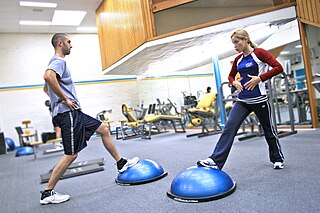
Outcome-based education or outcomes-based education (OBE) is an educational theory that bases each part of an educational system around goals (outcomes). By the end of the educational experience, each student should have achieved the goal. There is no single specified style of teaching or assessment in OBE; instead, classes, opportunities, and assessments should all help students achieve the specified outcomes. The role of the faculty adapts into instructor, trainer, facilitator, and/or mentor based on the outcomes targeted.

A personal trainer is an individual who has earned a certification that demonstrates they have achieved a level of competency for creating and delivering safe and effective exercise programs for apparently healthy individuals and groups or those with medical clearance to exercise. They motivate clients by collaborating to set goals, providing meaningful feedback, and by being a reliable source for accountability. Trainers also conduct a variety of assessments beginning with a preparticipation health-screening and may also include assessments of posture and movement, flexibility, balance, core function, cardiorespiratory fitness, muscular fitness, body composition, and skill-related parameters to observe and gather relevant information needed to develop an effective exercise program and support client goal attainment. These assessments may be performed at the beginning of and after an exercise program to measure client progress toward improved physical fitness. They also provide education on many other aspects of wellness, including general health and nutrition guidelines. Helping clients to reach their full potential in various aspects of life requires a comprehensive client-centered approach along with a belief that clients are resourceful and capable of change.
National Vocational Qualifications (NVQs) are practical work-based awards in England, Wales and Northern Ireland that are achieved through assessment and training. The regulatory framework supporting NVQs was withdrawn in 2015 and replaced by the Regulated Qualifications Framework (RQF), although the term "NVQ" may be used in RQF qualifications if they "are based on recognised occupational standards, work-based and/or simulated work-based assessment and where they confer occupational competence".

The Australian Qualifications Framework (AQF) specifies the standards for educational qualifications in Australia. It is administered nationally by the Australian Government's Department of Industry, with oversight from the States and Territories, through the Standing Council of Tertiary Education Skills and Employment. While the AQF specifies the standards, education and training organisations are authorised by accrediting authorities to issue a qualification.
A registered training organisation (RTO), in Australia, is an organisation providing Vocational Education and Training (VET) courses to students, resulting in qualifications or statements of attainment that are recognised and accepted by industry and other educational institutions throughout Australia.
A national qualifications framework is a formal system describing qualifications. 47 countries participating in the Bologna Process are committed to producing a national qualifications framework. Other countries not part of this process also have national qualifications frameworks.
Recognition of prior learning (RPL), prior learning assessment (PLA), or prior learning assessment and recognition (PLAR), describes a process used by regulatory bodies, adult learning centres, career development practitioners, military organizations, human resources professionals, employers, training institutions, colleges and universities around the world to evaluate skills and knowledge acquired outside the classroom for the purpose of recognizing competence against a given set of standards, competencies, or learning outcomes. RPL is practiced in many countries for a variety of purposes, for example an individual's standing in a profession, trades qualifications, academic achievement, recruitment, performance management, career and succession planning.
Competence is the set of demonstrable characteristics and skills that enable and improve the efficiency or performance of a job. The term "competence" first appeared in an article authored by R.W. White in 1959 as a concept for performance motivation. In 1970, Craig C. Lundberg defined the concept in "Planning the Executive Development Program". The term gained traction when in 1973, David McClelland wrote a seminal paper entitled, "Testing for Competence Rather Than for Intelligence". It has since been popularized by Richard Boyatzis and many others, such as T.F. Gilbert (1978) who used the concept in relationship to performance improvement. Its use varies widely, which leads to considerable misunderstanding.
The Commonwealth Register of Institutions and Courses for Overseas Students (CRICOS) is a register formed under the Education Services for Overseas Students (ESOS) Act 2000. It maintains a list of institutions, and courses, which have been granted permission by states and territories, to educate overseas students. It is a Federal framework under the authority of state and territory jurisdiction, and providers must register through these agents to legally educate and train international students. CRICOS, in conjunction with other federal and state/territory bodies and legislation, provides strict guidelines for institutions, accepts and/or declines registrations, monitors registered institutions’ compliance and ensures financial capability and stability.
A graduate certificate is an educational credential representing completion of specialized training at the college or university level. A graduate certificate can be awarded by universities upon completion of certain coursework indicating mastering of a specific subject area. Graduate certificates represent training at different levels in different countries and can be at bachelor's degree or master's degree level.
The National Training System is the Australian system for vocational education and training (VET) under the Australian Quality Training Framework (AQTF), in which employers, the States of Australia, and the Commonwealth Government, formalise a curriculum available for Registered Training Organisations (RTOs) to teach and assess the competency of students.
The Malaysian Skills Certification System is a skills and work-based certification system in Malaysia that is achieved through assessment and training. Candidates can receive Malaysian Skills award if they meet the requirements of the National Occupational Skills Standard developed and regulated by the Department of Skills Development.
'The Global Alliance for the Project Professions' (GAPPS) is a nonprofit organization who provides independent reference benchmarks for project management standards and assessments. Driven entirely by volunteers, the GAPPS is an alliance of government, private industry, professional associations, and training and academic institutions working to develop globally applicable performance based competency standards for project management. The GAPPS produces standards, frameworks, and comparability maps which are intended to facilitate mutual recognition of project management qualifications and are available for download, free of charge, from their website.

Diver training is the set of processes through which a person learns the necessary and desirable skills to safely dive underwater within the scope of the diver training standard relevant to the specific training programme. Most diver training follows procedures and schedules laid down in the associated training standard, in a formal training programme, and includes relevant foundational knowledge of the underlying theory, including some basic physics, physiology and environmental information, practical skills training in the selection and safe use of the associated equipment in the specified underwater environment, and assessment of the required skills and knowledge deemed necessary by the certification agency to allow the newly certified diver to dive within the specified range of conditions at an acceptable level of risk. Recognition of prior learning is allowed in some training standards.
The Cambridge English Teaching Framework is a professional development framework, designed by Cambridge English Language Assessment, which is used by English language teachers to self-assess and plan their own development.
TVET is education and training which provides knowledge and skills for employment. TVET uses formal, non-formal and informal learning. TVET is recognised to be a crucial vehicle for social equity, inclusion and sustainable development.
A qualifications framework is a formalized structure in which learning level descriptors and qualifications are used in order to understand learning outcomes. This allows for the ability to develop, assess and improve quality education in a number of contexts. Qualifications frameworks are typically found at the national, regional, and international level.
Competence assessment is a process in which evidence is gathered by the assessor and evaluated against agreed criteria in order to make a judgement of competence. Skill assessment is the comparison of actual performance of a skill with the specified standard for performance of that skill under the circumstances specified by the standard, and evaluation of whether the performance meets or exceed the requirements. Assessment of a skill should comply with the four principles of validity, reliability, fairness and flexibility.
A diver training standard is a document issued by a certification, registration regulation or quality assurance agency, that describes the prerequisites for participation, the aim of the training programme, the specific minimum competences that a candidate must display to be assessed as competent, and the minimum required experience that must be recorded before the candidate can be registered or certified at a specific grade by the agency. A standard is a description of the quality required of a product, or a way of doing something that has usually been derived from the experience of experts in a specific field. The purpose is to provide a reliable method for people to share a reasonably consistent expectation regarding the scope and quality of the product or service. Training standards allow objective comparison between the training provided by various agencies and the competence indicated by certification or registration to the specific standard, though in most cases, training and competence may exceed the minimum requirement much of the time, and variation between newly certified divers can be considerable, partly due to differences in the training, and partly due to qualities of the candidate. Training standards may narrowly prescribe the training, or may concentrate on assessment of exit level competence, and allow recognition of prior learning based on various forms of evidence. To be useful, a training standard must be sufficiently specific to allow agreement on the requirements by most readers reasonably competent in the field, including the instructors, assessors, and learners who must use it, the employers of persons trained, the potential customers, and any quality assurance personnel who may need to enforce it. A training standard may be linked to a code of practice referring to how the training should be carried out.
Refresher training is an aspect of retraining taken by a person already qualified or previously assessed as competent in a field with the intention of updating skills and/or knowledge to a changed standard, or providing the opportunity to ensure that no important skills or knowledge have been lost due to lack of use. In industry it is also used to upgrade performance of personnel faced with workplace changes or who use obsolete, deprecated, or outdated work procedures, as a method for improving productivity, customer service, employee satisfaction and retention, and workplace health and safety.



